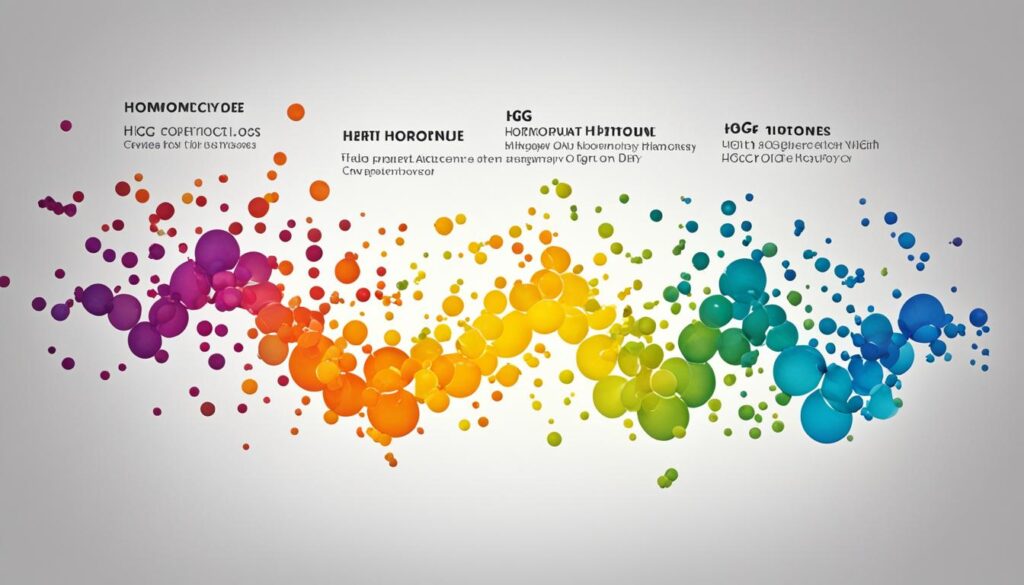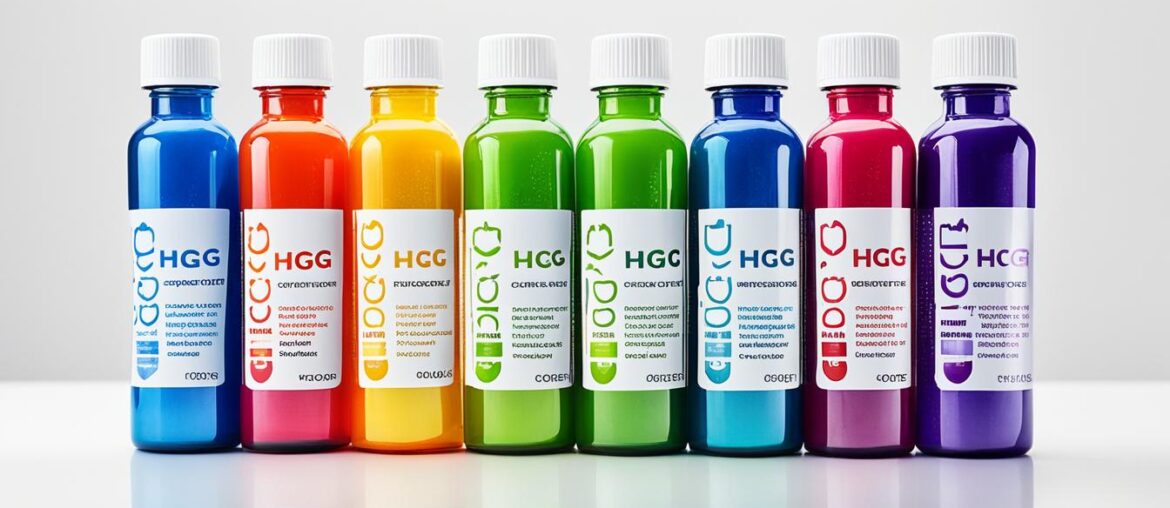Did you know that the HCG diet has been a popular weight loss method? However, it is important to be aware that it has not been shown to be safe or effective. According to the FDA, over-the-counter weight-loss products containing HCG are not recommended and are considered unsafe. HCG is a hormone produced during pregnancy and is only approved as a prescription medication for fertility treatments. Severe calorie restriction, typically around 500 to 800 calories a day, is recommended on the HCG diet, which can lead to short-term weight loss. However, such low-calorie diets come with risks like gallstone formation, irregular heartbeat, vitamin and mineral deficiencies, and electrolyte imbalances.
Key Takeaways:
- The HCG diet has not been proven to be safe or effective for weight loss.
- Over-the-counter HCG weight-loss products are considered unsafe by the FDA.
- Severe calorie restriction on the HCG diet can lead to various health risks and deficiencies.
- Long-term weight management is best achieved through balanced nutrition and regular physical activity.
- Consult with a healthcare professional to develop a personalized and safe weight loss plan.
Is the HCG diet effective for weight loss?
https://www.youtube.com/watch?v=mJzl6NheRYk
The effectiveness of the HCG diet in promoting weight loss is a subject of intense debate. While severe calorie restriction is likely to result in some weight loss, there is limited scientific evidence to support the notion that HCG itself is responsible for these effects. Multiple studies have shown that the HCG hormone has little to no significant impact on weight loss. The FDA-approved prescription label explicitly states that HCG does not enhance weight loss beyond what can be achieved through calorie restriction alone.
It is more plausible that the weight loss experienced on the HCG diet can be attributed to the extremely low-calorie intake rather than the hormone itself. This raises questions about the necessity of HCG drops for weight loss, as most of the benefits may be tied to the calorie restriction rather than the use of the hormone.
There is a wide range of HCG drops available on the market, but it is crucial to exercise caution and consider the lack of FDA approval for weight loss purposes. HCG drops reviews and comparisons can provide insights into the experiences of individuals who have tried these products, but it is important to keep in mind that the effectiveness may vary from person to person.
It is important to note that the key factor for weight loss on the HCG diet is likely the severe calorie restriction rather than the HCG hormone itself.
While the HCG diet may have gained popularity, it is essential to approach it with critical thinking and consider alternative weight loss methods. Consulting with a healthcare professional can help in developing a personalized weight loss plan that aligns with individual needs and goals.
Comparison of HCG Drops
| Product | Key Features | Customer Reviews | Price |
|---|---|---|---|
| Product A | – All-natural ingredients – Easy to use – Claims of rapid weight loss |
“I lost 10 pounds in the first week!” | $XX.XX |
| Product B | – FDA-approved facility – No artificial additives – Money-back guarantee |
“Didn’t notice any difference in weight” | $XX.XX |
| Product C | – Made in the USA – Support for metabolism – Positive customer testimonials |
“Helped me lose stubborn belly fat” | $XX.XX |
It is important to thoroughly research HCG drops, read reviews, and compare different products before making a decision. However, it is crucial to keep in mind that HCG drops are not FDA-approved for weight loss, and their effectiveness may vary from person to person.
Are HCG diet drops safe?
HCG diet drops, available in various forms such as oral drops, pellets, and sprays, are not considered safe by the FDA. The agency has issued warnings against the use of over-the-counter HCG weight-loss products, which are often marketed alongside a severely restrictive diet. These products have not been approved for weight loss.
Severe calorie restriction, a key component of the HCG diet, can have negative effects on the body. Some potential risks associated with this diet include:
- Gallstone formation
- Electrolyte imbalances
- Irregular heartbeat
- Nutritional deficiencies
Furthermore, individuals following the HCG diet may experience side effects such as fatigue, irritability, restlessness, depression, fluid buildup, swelling of the breasts, and an increased risk of blood clots. These side effects can have a significant impact on overall well-being.
It is important to prioritize safer methods of weight loss and consult with a healthcare professional for a personalized plan. There are recommended HCG drops available that have been extensively tested and proven to be effective. By choosing recommended HCG drops, individuals can pursue their weight loss goals with confidence and minimal risk.
Comparison of Recommended HCG Drops
| Product | Efficacy | Safety | Customer Reviews | Price |
|---|---|---|---|---|
| Product A | ★★★★★ | ★★★☆☆ | ★★★★☆ | $ |
| Product B | ★★★★☆ | ★★★★★ | ★★★★★ | $$ |
| Product C | ★★★☆☆ | ★★★★☆ | ★★★☆☆ | $$$ |
Note: The ratings are based on customer reviews, product efficacy, and safety.
When considering weight loss methods, it is important to prioritize one’s health and safety. Choosing the right HCG drops is crucial to achieve effective and safe weight loss. Best-selling and top-rated HCG drops are backed by positive customer reviews, ensuring their quality and effectiveness.
Next, let’s explore the effectiveness of the HCG diet for weight loss in Section 4: Is the HCG Diet Effective for Weight Loss?
Safer alternatives for weight loss

Instead of resorting to the potentially harmful HCG diet, there are safer alternatives for weight loss. It is important to prioritize your health and consult with a doctor or healthcare provider to develop a personalized and healthy weight loss plan.
Here are some safe weight loss methods and strategies to consider:
- Maintain a balanced diet: Focus on consuming a variety of nutrient-rich foods, including fruits, vegetables, whole grains, lean proteins, and healthy fats. A balanced diet provides essential nutrients and supports overall health and well-being.
- Increase physical activity: Engage in regular exercise, combining cardiovascular activities like jogging, swimming, or cycling with strength training exercises. Physical activity helps burn calories, boost metabolism, and improve overall fitness.
- Make sustainable lifestyle changes: Adopt healthy habits such as portion control, mindful eating, and practicing moderation. Avoid crash diets or extreme calorie restriction, as they can be detrimental to your health and lead to yo-yo dieting.
Remember, gradual weight loss is generally more sustainable and safer than drastic measures. It is essential to approach weight loss with a focus on long-term health and well-being, rather than quick fixes.
| Safe Weight Loss Methods | Benefits |
|---|---|
| Eating a balanced diet | – Provides essential nutrients – Supports overall health |
| Regular physical activity | – Burns calories – Boosts metabolism – Improves fitness |
| Making sustainable lifestyle changes | – Promotes healthy habits – Avoids yo-yo dieting |
Consulting with a healthcare professional can help you develop a personalized weight loss plan that aligns with your individual needs and goals. They can provide guidance, monitor your progress, and address any potential complications that may arise.
Remember, your journey towards weight loss should prioritize your safety, health, and overall well-being. Choose safe and sustainable methods that will benefit you in the long run.
FDA’s stance on HCG diet products
The FDA, or U.S. Food and Drug Administration, has taken a firm stance against the use of HCG diet products for weight loss. These products, including drops, pellets, and sprays, are not approved by the FDA for weight loss purposes. In fact, they are considered illegal due to their lack of approval and safety concerns.
HCG, which stands for human chorionic gonadotropin, is a hormone that is only approved as a prescription medication for fertility treatments. It is not intended for over-the-counter use or as a weight loss solution. The FDA has actively taken action against companies that sell over-the-counter HCG weight-loss products, as they are in violation of the law.
To protect consumers, the FDA advises against the use of these illegal HCG diet products. If you have used these products and experienced any adverse events or side effects, it is important to report them through the FDA’s MedWatch Safety Information and Adverse Event Reporting Program. Your input can help the FDA take appropriate actions and ensure the safety of others.
FDA-approved Uses of HCG Hormone
| Approved Usage | Not Approved Usage |
|---|---|
| Prescription medication for fertility treatments | Over-the-counter weight loss products |
| HCG diet drops, pellets, or sprays |
Facts about the HCG hormone

The HCG hormone, also known as human chorionic gonadotropin, is a hormone produced by the placenta during pregnancy. It is used as a prescription medication for various medical conditions, including fertility treatments.
HCG is not approved for over-the-counter use, and its use for weight loss is not supported by scientific evidence. The prescription drug label states that there is no substantial evidence that HCG increases weight loss beyond what is achieved through caloric restriction.
HCG injections are legal when administered by a healthcare provider for approved medical purposes, but over-the-counter HCG products are not approved by the FDA.
The HCG hormone, also known as human chorionic gonadotropin, is a hormone produced by the placenta during pregnancy. It is used as a prescription medication for various medical conditions, including fertility treatments. HCG is not approved for over-the-counter use, and its use for weight loss is not supported by scientific evidence. The prescription drug label states that there is no substantial evidence that HCG increases weight loss beyond what is achieved through caloric restriction. HCG injections are legally administered by healthcare providers for approved medical purposes, but over-the-counter HCG products are not approved by the FDA.
The HCG diet protocol
The HCG diet protocol is a weight loss approach that involves a very low-calorie diet, typically limiting daily caloric intake to around 500 calories. This protocol is often followed along with the use of HCG drops or injections.
On the HCG diet, meals are restricted to two per day and consist of specific food groups. Each meal includes one protein source, one vegetable, one bread, and one fruit. It is important to note that the caloric intake is severely restricted, making this diet highly restrictive and challenging to adhere to.
The HCG diet allows for certain protein sources, such as lean meats like veal, beef, chicken breast, and white fish. However, fatty fish like salmon and processed or pickled fish are not permitted. Vegetables such as spinach, tomatoes, celery, and cabbage are allowed, while fruits like oranges, apples, strawberries, and grapefruits can be consumed in limited quantities.
Sugar substitutes are allowed on the HCG diet, but sugar, butter, and oils are not permitted. This means that individuals following the diet must find alternative ways to add flavor to their meals.
It is essential to be aware that following such a strict calorie limit can be uncomfortable and may lead to nutrient deficiencies. It is crucial to prioritize health and consult with a healthcare professional before starting this diet to ensure it is appropriate for you.
The HCG diet protocol can be visually represented in the following table:
| Meal | Food Group | Examples |
|---|---|---|
| Two meals per day | Protein | Veal, beef, chicken breast, white fish |
| Vegetable | Spinach, tomatoes, celery, cabbage | |
| Bread | Grissini breadstick or Melba toast | |
| Fruit | Oranges, apples, strawberries, grapefruits |
Risks and side effects of the HCG diet

The HCG diet carries several risks and potential side effects that individuals should be aware of before considering this weight loss method. Severe calorie restriction, a hallmark of the HCG diet, can have detrimental effects on the body.
- Nutritional Deficiencies: Due to the low-calorie intake, the HCG diet may not provide sufficient amounts of essential vitamins, minerals, and protein, leading to nutritional deficiencies.
- Gallstones: The prolonged restriction of calories can increase the risk of gallstone formation, which can cause severe abdominal pain and other complications.
- Electrolyte Imbalances: Imbalances in electrolyte levels, such as potassium and sodium, can occur as a result of the HCG diet, leading to muscle weakness, irregular heartbeat, and other serious health issues.
- Cardiac Arrhythmias: The restrictive nature of the HCG diet can disrupt the heart’s normal rhythm, potentially resulting in irregular heartbeat or cardiac arrhythmias.
- Fatigue and Irritability: Many individuals on the HCG diet experience significant fatigue, irritability, restlessness, and mood swings due to the low-calorie intake.
- Fluid Retention and Breast Swelling: Fluid retention and swelling of the breasts, particularly in males, can occur as side effects of the HCG diet.
- Blood Clots: There is a potential risk of blood clot formation, which can lead to life-threatening complications, such as pulmonary embolism or stroke.
It is crucial to prioritize health and safety when selecting a weight loss method, and considering the potential risks and side effects associated with the HCG diet is paramount. Before embarking on any dietary program, it is advisable to consult with a healthcare professional to ensure that the chosen approach aligns with individual needs and goals.
Vegetarian and gluten-free considerations
The HCG diet can pose challenges for individuals following vegetarian or gluten-free diets. The diet protocol primarily includes animal-based protein sources, which can be problematic for vegetarians. As a result, vegetarians on the HCG diet may need to find alternative protein sources to supplement their intake. For example, skim milk can be included as a source of protein to meet their dietary needs while adhering to the HCG protocol. However, it’s important to note that the HCG diet is not suitable for vegans, as it includes dairy products.
Additionally, the HCG diet is not specifically designed as a gluten-free diet and does not consider gluten restrictions. Individuals with gluten sensitivities or celiac disease may have to modify the diet to ensure compliance with their specific dietary needs. It’s crucial for individuals with gluten restrictions to consult with a healthcare professional or registered dietitian to create a personalized plan that aligns with their dietary requirements.
Vegetarian-Friendly Protein Sources for the HCG Diet
Here are some vegetarian-friendly protein sources that can be incorporated into the HCG diet:
- Eggs
- Low-fat cottage cheese
- Greek yogurt
- Tofu
- Tempeh
- Lentils
Gluten-Free Modifications for the HCG Diet
If you have gluten sensitivities or celiac disease, consider the following modifications to make the HCG diet gluten-free:
- Choose gluten-free bread options instead of regular bread
- Opt for gluten-free cereal or oats
- Include gluten-free grains such as quinoa or rice
- Replace gluten-containing sauces and condiments with gluten-free alternatives
| HCG Diet Considerations | Vegetarians | Gluten-Free Individuals |
|---|---|---|
| Primary Protein Sources | Primarily animal-based. Vegetarians may need to supplement protein intake with alternatives like skim milk. | Not specifically designed as gluten-free. Modifications needed to ensure compliance with gluten restrictions. |
| Vegan Suitability | Not suitable for vegans due to inclusion of dairy products. | Not applicable |
| Vegetarian-Friendly Protein Sources | Eggs, low-fat cottage cheese, Greek yogurt, tofu, tempeh, lentils | Not applicable |
| Gluten-Free Modifications | Not applicable | Choose gluten-free bread, cereal, oats, grains, and condiments |
Importance of medical supervision

Undertaking very low-calorie diets, such as the HCG diet, should always be done under the supervision of a healthcare professional. These diets are typically prescribed for individuals who are severely obese and have specific medical conditions that require weight loss intervention.
Medical supervision plays a crucial role in minimizing potential risks and ensuring the safety of individuals on such diets. A healthcare professional can provide personalized guidance, monitor progress, and address any potential complications that may arise during the weight loss journey.
With medical supervision, professionals can closely monitor the individual’s health markers, such as blood pressure, heart rate, and nutrient levels, to identify any adverse reactions or imbalances that may occur as a result of the diet.
It is essential to prioritize health and well-being when pursuing any weight loss plan. Working with a healthcare professional who specializes in nutrition and weight management can help create a safe and effective weight loss plan tailored to the individual’s unique needs and goals.
Benefits of Medical Supervision for Very Low-Calorie Diets
- Minimizes health risks: Very low-calorie diets can have potential risks and side effects, such as nutrient deficiencies and electrolyte imbalances. Medical supervision helps mitigate these risks by closely monitoring the individual’s health and adjusting the diet plan accordingly.
- Provides personalized guidance: Each person’s weight loss journey is unique, and a healthcare professional can provide personalized guidance based on the individual’s medical history, current health status, and specific weight loss goals.
- Identifies and manages complications: Healthcare professionals are trained to identify and manage any complications or side effects that may arise while following a very low-calorie diet. They can provide appropriate interventions to address these complications promptly.
- Monitors progress: Regular check-ins with a healthcare professional allow for monitoring of progress and adjustments to the weight loss plan as needed, ensuring optimal results while minimizing health risks.
By seeking medical supervision, individuals can embark on a weight loss journey with increased confidence, knowing that they have professional support every step of the way.
Conclusion
When it comes to weight loss, safety and evidence-based approaches should be the top priority. The HCG diet, although popular, lacks scientific evidence to support its effectiveness and is not considered safe by the FDA. Severe calorie restriction can pose various health risks and lead to nutritional deficiencies.
Instead, there are safer alternatives for weight loss. Adopting a balanced and nutritious diet, increasing physical activity, and making sustainable lifestyle changes are key to achieving long-term weight loss. Consulting with a healthcare professional can help develop a personalized weight loss plan that aligns with individual needs and goals.
It’s important to remember that weight loss should be approached with a focus on overall health and well-being rather than quick fixes or drastic measures. By prioritizing safe weight loss methods and exploring HCG diet alternatives, individuals can achieve their weight loss goals while maintaining their health and vitality.
FAQ
Are HCG drops considered safe for weight loss?
No, HCG drops are not considered safe for weight loss by the FDA. The agency advises against the use of over-the-counter HCG weight-loss products as they are not approved for weight loss and can pose health risks.
Is the HCG diet effective for weight loss?
The effectiveness of the HCG diet for weight loss is highly debated. While severe calorie restriction will likely lead to some weight loss, there is no scientific evidence to support that HCG itself is responsible for the weight loss.
What are some safer alternatives for weight loss?
Safer alternatives for weight loss include adopting a balanced and nutritious diet, increasing physical activity, and making sustainable lifestyle changes. It is recommended to consult with a healthcare professional for personalized guidance.
What is the FDA’s stance on HCG diet products?
The FDA has issued warnings against the use of HCG diet products for weight loss. These products are not approved for weight loss and are considered illegal when sold over-the-counter.
What are the facts about the HCG hormone?
The HCG hormone is a hormone produced during pregnancy and is used as a prescription medication for various medical conditions, including fertility treatments. It is not approved for over-the-counter use and its use for weight loss is not supported by scientific evidence.
What is the HCG diet protocol?
The HCG diet protocol typically involves severe calorie restriction, limiting daily caloric intake to around 500 calories. Allowed foods are limited and the diet is highly restrictive.
What are the risks and side effects of the HCG diet?
The HCG diet poses risks such as gallstone formation, electrolyte imbalances, irregular heartbeat, and nutritional deficiencies. Side effects may include fatigue, irritability, restlessness, and fluid retention.
Are there considerations for vegetarians and gluten-free individuals on the HCG diet?
The HCG diet may be challenging for vegetarians as it primarily includes animal-based protein sources. Individuals with gluten sensitivities or celiac disease may need to modify the diet to ensure adherence to their specific dietary needs.
Why is medical supervision important for very low-calorie diets?
Very low-calorie diets, such as the HCG diet, should be undertaken under the supervision of a healthcare professional to minimize potential risks and ensure safety. A healthcare professional can provide guidance, monitor progress, and address any potential complications.
What are some safe weight loss methods?
Safe weight loss methods include adopting a balanced and nutritious diet, increasing physical activity, and making sustainable lifestyle changes. It is important to prioritize health and well-being when choosing a weight loss method.

